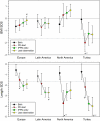Growth in very young children undergoing chronic peritoneal dialysis
- PMID: 22021715
- PMCID: PMC3279935
- DOI: 10.1681/ASN.2010020192
Growth in very young children undergoing chronic peritoneal dialysis
Abstract
Very young children with chronic kidney disease often have difficulty maintaining adequate nutrition, which contributes to the high prevalence of short stature in this population. Characteristics of the dialysis prescription and supplemental feeding via a nasogastric (NG) tube or gastrostomy may improve growth, but this is not well understood. Here, we analyzed data from 153 children in 18 countries who commenced chronic peritoneal dialysis at <24 months of age. From diagnosis to last observation, 57 patients were fed on demand, 54 by NG tube, and 10 by gastrostomy; 26 switched from NG to gastrostomy; and 6 returned from NG to demand feeding. North American and European centers accounted for nearly all feeding by gastrostomy. Standardized body mass index (BMI) uniformly decreased during periods of demand feeding and increased during NG and gastrostomy feeding. Changes in BMI demonstrated significant regional variation: 26% of North American children were obese and 50% of Turkish children were malnourished at last observation (P < 0.005). Body length decreased sharply during the first 6 to 12 months of life and then tended to stabilize. Time fed by gastrostomy significantly associated with higher lengths over time (P < 0.001), but adjustment for baseline length attenuated this effect. In addition, the use of biocompatible peritoneal dialysate and administration of growth hormone independently associated with improved length, even after adjusting for regional factors. In summary, growth and nutritional status vary regionally in very young children treated with chronic peritoneal dialysis. The use of gastrostomy feeding, biocompatible dialysis fluid, and growth hormone therapy associate with improved linear growth.
Figures


References
-
- Karlberg J, Schaefer F, Hennicke M, Wingen AM, Rigden S, Mehls O: Early age-dependent growth impairment in chronic renal failure. European Study Group for Nutritional Treatment of Chronic Renal Failure in Childhood. Pediatr Nephrol 10: 283–287, 1996 - PubMed
-
- Kari J, Gonzalez C, Ledermann SE, Shaw V, Rees L: Outcome and growth of infants with chronic renal failure. Kidney Int 57: 1681–1687, 2000 - PubMed
-
- Strife CF, Quinlan M, Mears K, Davey ML, Clardy C: Improved growth of three uremic children by nocturnal nasogastric feedings. Am J Dis Child 140: 438–443, 1986 - PubMed
Publication types
MeSH terms
LinkOut - more resources
Full Text Sources

